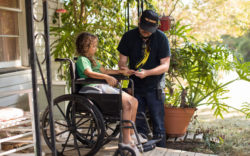Something Old, Something New: As spring beckons with warm days and lingering sunlight in the evenings, it seems a shame to keep the kids cooped up inside. So, where do I end up this past month with my 4-year-old? Inside, at the Georgia Museum of Natural History.
I know, it’s a great time of year to work on that farmer’s tan. But as it turns out, looking at the myriad fauna of the Southeast, lovingly preserved and labeled for future generations, can be a nice alternative to heading to one of our many parks.
Stay with me here. I’m a big believer in letting kids explore outside. But for the most part, that kind of exploring will get you some worms, some beetles and maybe a grub or two. (Or, in the case of my neighborhood, lubbers and kudzu bugs.) Which is why I was curious about the Georgia Museum of Natural History.
But first, let’s be clear: This isn’t an extravagant “museum” like you may find in metropolitan areas, fitted with glass cases of rocks, dinosaur bones or anthropological studies. It’s pretty bare-bones, but it’s recently been expanded into a two-floor space, so now the collection has some defined areas. Located in a brick wing of UGA’s Natural History/Statistics building at East Campus Road and Cedar Street, it’s the keeper of preserved birds, mammals and insects primarily from the Southeast, but also includes some rare and exotic specimens from around the world.
Let’s be clear about something else: we’re talking dead things. But, they’re cool dead things, often set up in a “study skin” pose or mounted on a foam board with documentation such as where and when the animal was found (example: on a rural highway in Kentucky in 1954), the contents of its stomach (bugs or other animals) and the situation that led to it being collected and preserved (often a scientist on a field expedition). Walking into the lobby, you’re greeted by some of the largest animals in the collection, stuffed and mounted and recently donated by a collector in Savannah. The posed carnivores, herbivores, insectivores and birds represent a “predator and prey” theme, but Liz McGhee, assistant curator and collections manager, said she plans to swap out new animals on a regular basis. There also are two aquariums housing the only live animals among the specimens: corn snakes and gray tree frogs.
Beyond the main lobby, you enter two worlds: one of reptiles, amphibians and fish and another of insects and invertebrates. McGhee is more than happy to open cabinet doors on the first floor and show visitors preserved birds, bats, fox squirrels or opossums. Upstairs, Cecil Smith is the associate curator and collections manager for the entomology collections: moths, beetles, spiders, butterflies and more. All together, there are more than 1.5 million pieces in the museum’s collections, with many thousands more still being cataloged.
Sure, the endless bugs and animals are fascinating. But what had me captivated was my daughter’s reaction. We easily spent 45 minutes with each collection, and while my 4-year-old couldn’t touch the things McGhee or Smith pulled out of the array of drawers, she didn’t seem to mind. Instead, it had her thinking of different types of animals or insects, then following the curators to see them in person. It’s not often you can keep a child occupied—and not wanting to leave—after more than an hour in a room filled with cabinets.
There is parking available in the green spaces near the building; it’s open by appointment only 10 a.m.–4 p.m. Monday–Friday, but visitors are welcome for tours without appointments from noon–3 p.m. Saturdays—call (706) 542-1663.
Very Berries: Eventually, you’ll want to take all your children’s newfound knowledge outside, and luckily there are several events coming up that celebrate nature and the outdoors. Washington Farms in Watkinsville will hold its second annual Strawberry Festival from 9 a.m.–6 p.m. Saturday, Apr. 28. It’s similar to what they do there in the fall, only without the pumpkins; instead, there’s a tennis ball slingshot and a host of other kid-friendly events, plus live music and a strawberry cook-off.
We Like Bikes: There are plenty of kid-centric activities associated with the Twilight Criterium this weekend, too. Be sure to take a close look at the schedule of Twilight events in this week’s Flagpole.
Springtime in Winterville: The kids can also catch live music at the Winterville Marigold Festival next month. It’s regained its footing after taking a hiatus for a few years, now fully embracing its small-town festival roots. And because so many talented musicians now call Winterville home, the music lineup may rival AthFest in terms of local talent (actually, last year several artists who played at AthFest also played at the Marigold festival, from what the mayor tells me). The festival kicks off at 8 a.m. on May 19 at Pittard Park with a 5K family fun run/walk, a parade at 10 a.m. and a car show at 11 a.m. Plus, there are vendors, food, usually a couple of alpacas and a nice little playground at the park. Get details as they’re finalized at the festival website.
Like what you just read? Support Flagpole by making a donation today. Every dollar you give helps fund our ongoing mission to provide Athens with quality, independent journalism.










